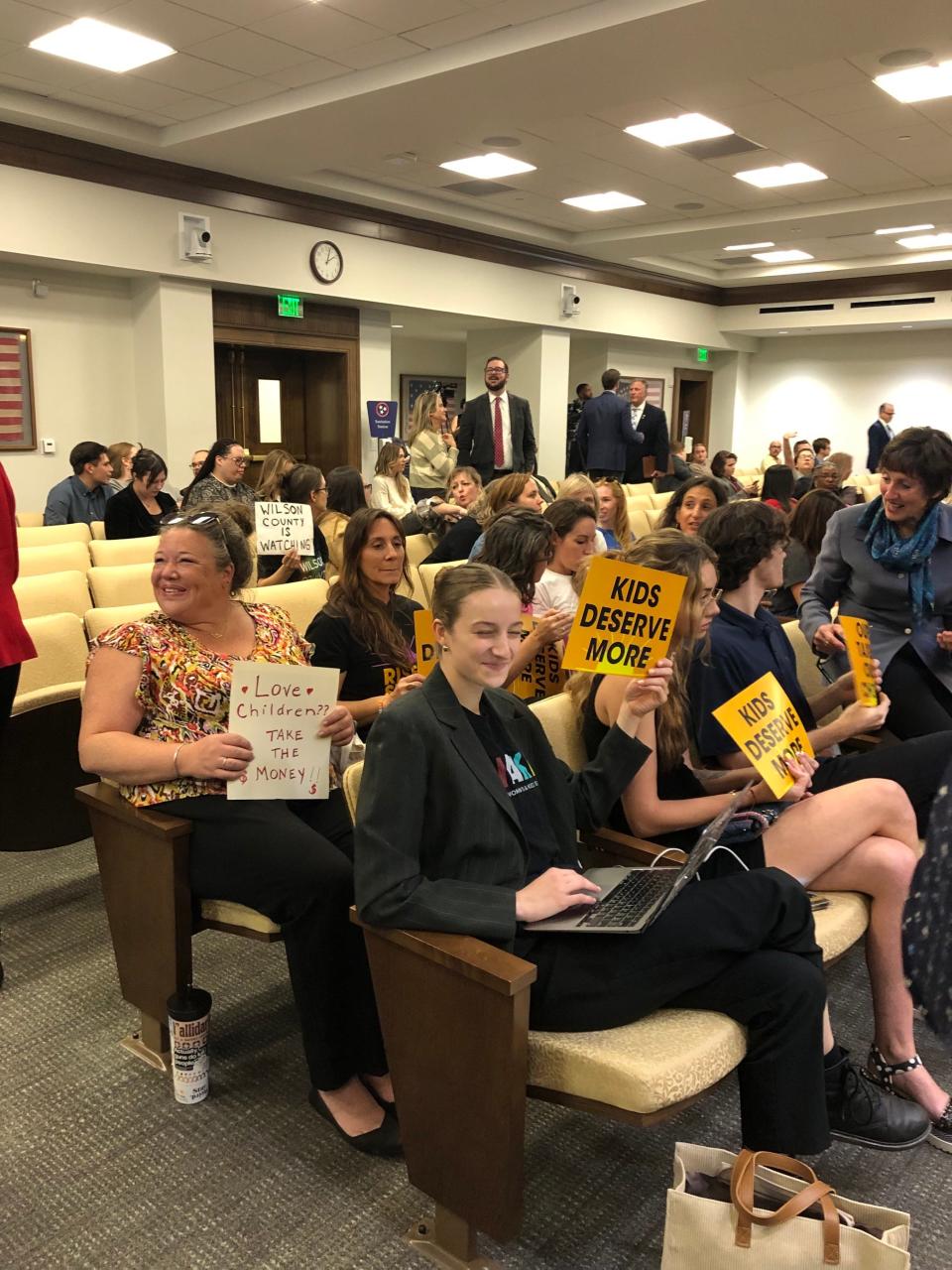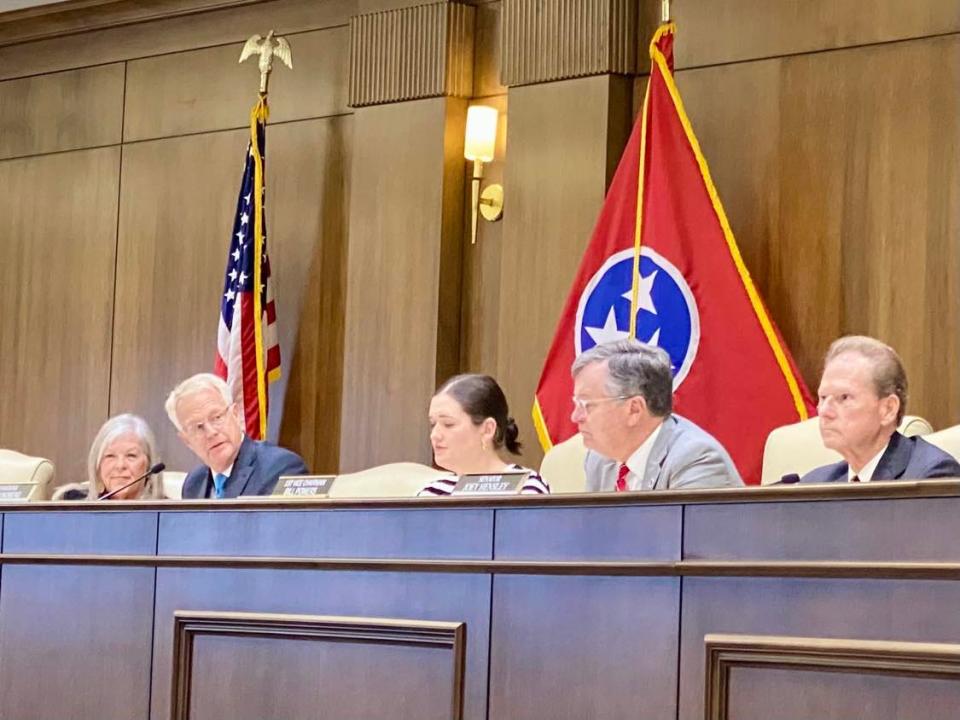Tennessee lawmakers launch review, consider rejecting federal K-12 funding
A legislative working group to study whether it is feasible for the state of Tennessee to reject nearly $1.9 billion a year in federal funding for K-12 education began its work on Monday.
Legislative leaders appointed the 10-member panel to determine whether the state can reject the funding and make up the difference in state money, and to recommend a strategy for how to do so before the legislature reconvenes in January.
If the panel recommends rejecting the funds and lawmakers act on it, Tennessee would be the first state to undertake such an endeavor.
Working group co-chairs Rep. Debra Moody, R-Covington, and Sen. Jon Lundberg, R-Bristol, made opening statements. The group also heard presentations from the Tennessee Comptroller’s Office of Research and Education Accountability and the executive director of the fiscal review committee.

“In this memo there is nothing that tasks this group with cutting even $1 of education funding,” Lundberg said in his opening statement. “There is no precursor to the outcome of what this task force is going to do.”
A few dozen people filled the center of the room, many of them holding signs — which Lundberg asked be held below face level. The signs had messages like "Wilson County is watching," "kids deserve more," "our taxes, our choice" and "eyes wide open."
From September: Tennessee Gov. Bill Lee open to rejecting $1.8B in federal school funding, cites 'excessive overreach'
How federal funding filters into Tennessee schools
Five federal formula grant programs make up 93% of Tennessee’s federal funding allocations, according the comptroller's analysis.
“Federal funds play a huge role in the fiscal liability that the state incurs,” Fiscal Review Director Krista Lee Carsner told the working group.
Carsner did not provide a fiscal estimate of what it would cost the state to operate required federal programs without accepting federal money.
Office of Research and Education Accountability Assistant Director Linda Wesson outlined the top five categories federal funding supports in Tennessee K-12 education:
Title I, which funds programs for economically disadvantaged students
Individuals with Disabilities Education Act, which provides resources for students with disabilities
The Child Nutrition program, which funds school lunches, breakfasts, snacks, and milk
Title II, which supports effective instruction
Perkins V, which goes toward career and technical education

Rep. Ronnie Glynn, D-Clarksville, posed a question to the comptroller team.
"If we reject those funds, how would our kids eat?” Glynn asked, as audience members snapped their fingers in assent.
Federal funding constitutes up to 18% of education budgets in some counties, as of the 2018-19 school year. Campbell County receives the highest percentage of federal funds, with 18.39% of the county’s education funds coming from federal sources.
Analysis: Tennessee may reject federal education funding. Here's how much each district spends now.
Predictably, given the federal programs that are the sources of funding, less affluent counties rely more on federal dollars than high-income counties do. In 2018-19, only 3.13% of Williamson County’s education funds came from federal sources, according to the Office of Research and Education Accountability. That same year, federal funding also made up less than 8% of the K-12 education budget in Wilson, Lincoln, Moore, Rutherford, Sumner and Blount counties.
However, those numbers grew statewide with the influx of billions in COVID-19 relief funds from the federal government. Those funds are set to expire next year, leaving districts nationwide facing what many call a "funding cliff."
'A slippery slope'
Senate Minority Leader Raumesh Akbari, D-Memphis, expressed concerns over the far-reaching implications of rejecting funding from federal agency versus others.
"It really is a slippery slope," Akbari said. "If we look at education, then at what point are going to talk about transportation? And then we're going to talk about health. There's only so much money the state could fund."
Akbari and Glynn are the sole Democrats on the working group.
House Speaker Cameron Sexton, R-Crossville, repeatedly expressed interest in rejecting federal education funding during the legislative session earlier this year. He cited federal mandates attached to the funding, including standardized testing like the Tennessee Comprehensive Assessment Program.
Sen. Dawn White, R-Murfreesboro, who was appointed to the panel, was not present for the meeting.
The group is scheduled to hold several meetings both this week and next, before it adjourns on Nov. 16 to make its recommendations.
How to attend, watch future meetings
Tuesday, Nov. 7 from 9 a.m. to 11 a.m. and 1 p.m. to 3 p.m. — The Sycamore Institute and district leaders input
Wednesday, Nov. 8 from 9 a.m. to 11 a.m. — U.S. Department of Education and the National Conference of State Legislatures
Tuesday, Nov. 14 from 9 a.m. to 11 a.m. — Tennessee Department of Education
Wednesday, Nov. 15 from 9 a.m. to 11 a.m. and 1 p.m. to 3 p.m. — The Office of Research and Education Accountability
All meetings are scheduled to take place at the Senate Hearing Room 1 in the Cordell Hull State Office Building located at 425 Rep. John Lewis Way N in Nashville. A full schedule and links to watch the meetings can be found at wapp.capitol.tn.gov/apps/schedule.
This article originally appeared on Nashville Tennessean: Tennessee lawmakers launch discussions on rejecting federal K-12 funds

